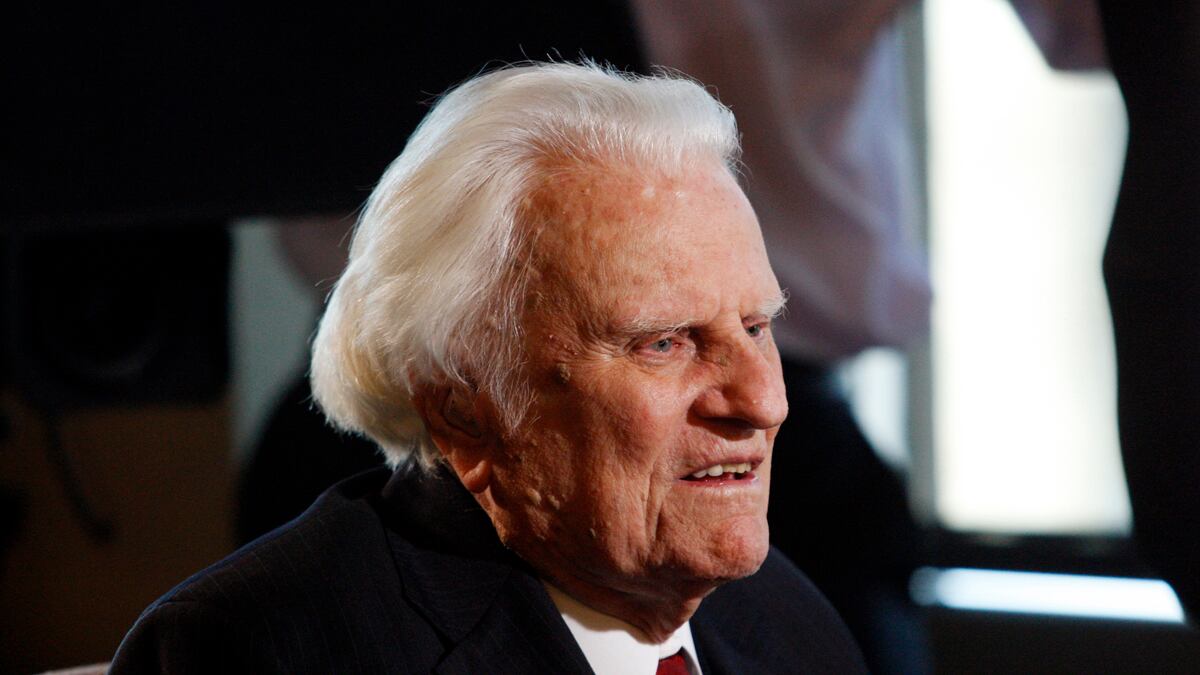Billy Graham took an unusual step into the political arena this week, pledging his support for a ballot initiative that would make it next to impossible to legalize gay marriage in North Carolina, where it is already legally banned. Graham, who is 93 and recently survived an extended hospital stay, released a statement that will be published in 14 newspapers ahead of next Tuesday’s vote.
“Watching the moral decline of our country causes me great concern,” Graham said. “I believe the home and marriage is the foundation of our society and must be protected.”
The move raised eyebrows because of Graham’s general reluctance to bring hot-button political issues into his ministry. While he always affirmed the standard evangelical view that homosexuality is a sin, he rarely mentioned it except to downplay it. “There are other sins. Why do we jump on that sin as though it’s the greatest sin?” he asked at a 1997 conference in San Francisco, adding that his job was to minister to people regardless of their orientation. The peak of Graham’s influence among evangelicals coincided with the rise of the religious right, as harder-edged political figures like Jerry Falwell and Pat Robertson replaced Graham’s soft-spoken ecumenicism.
Graham is the type who might have been expected to go soft on such a divisive issue. Though theologically conservative, he came up in a different era—a time when bipartisan consensus was a still a feature of Washington politics and before the “conservative resurgence” drew rigid lines around evangelical Christian doctrines. Among his stances that wouldn’t fly with his harder-core successors, Graham frequently hinted that he believed followers of other faiths could go to heaven. In general, he tended to err on the side of inclusion and compassion. “As I got older, I guess I became more mellow and more forgiving and more loving,” he told Larry King in 2005. He explained that “the love of God” was the center of the Christian message, and that he felt increasingly convinced that “side trends” were outside his mission.

Graham’s stance against gay marriage might also seem odd because it comes at a moment when other evangelical figures are gradually beginning to question their focus on Pyrrhic political battles. Charles Colson, the late former Nixon aide who became a religious-right heavyweight, expressed regret that his movement had “politicized the gospel.” Jim Daly, the current president of Focus on the Family, who has been working strenuously to give the organization a less political makeover, has all but admitted that the crusade against gay marriage is a lost cause. Though conservative Christian causes actually are winning electorally—their state-level rollback of abortion rights, for example—the swift turn of public opinion in favor of gay marriage and resulting unpopularity of those who oppose it has gradually motivated some evangelical leaders to downplay their stances.
But what appears to be a departure for Graham actually illustrates an ongoing dilemma for evangelical Christians: the fact that they’ve realized they need to change their tone while remaining determined to hold on to the old message. There have been signs of progress: young evangelicals tend to despise the legacy of the past few decades, and have begun spreading out across the political spectrum. Pseudoscientific views about the earth’s origins, climate change, and homosexuality—all of which have played outsize roles in evangelical political activism—are gradually losing their grip. But all of these developments were driven less by intellectual growth than by bad luck: the Bush administration deeply discredited the alliance between evangelicals and the GOP, and the rapid mainstream acceptance of homosexuality meant conservative Christians were increasingly seen as cruel and bigoted. To the extent conservative evangelical leaders have backed away from issues like gay marriage, it’s had more to do with desperation at this situation than enlightenment on the issue.
That leaves them in the awkward position of downplaying political positions they still take: Focus on the Family, for example, is still just as opposed to gay marriage as it was before its image makeover, though you’ll never see anything about it on their main organization’s website. There has been little pressure from within the movement for those backing away from old culture-war narratives to substantively adjust course. Virtually no major evangelical figures or institutions have switched sides on the issue—including the liberal ones, who tend to keep their actual views quiet or vague. Evangelical gay-marriage supporters’ reluctance to take a stand, however well-intentioned it may be, allows conservative figures and groups to adopt conciliatory language and a veneer of moderation while keeping the same old content.
Billy Graham is a prime example of the lack of evangelical theological development on marriage even as the rhetoric has seemed to become “more mellow.” The stormy cultural winds and the disaffection of a younger generation forced a reconsideration of tone, but doctrine lags far behind. When the circumstances require them to speak, all they can do is repeat the same clichés, as Graham did in his statement this week: “The Bible is clear—God’s definition of marriage is between a man and a woman.”





